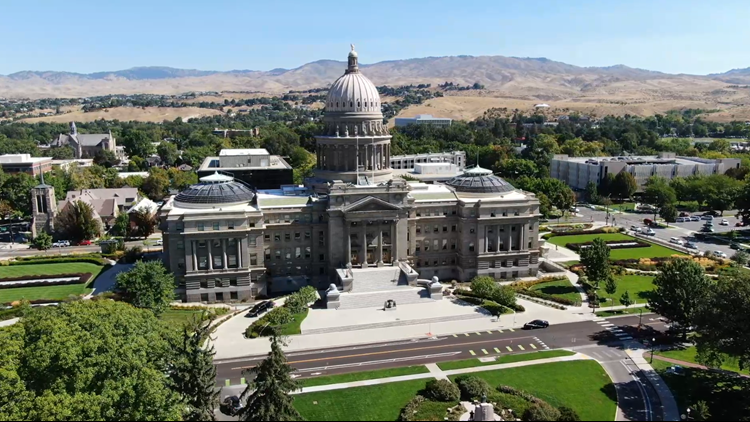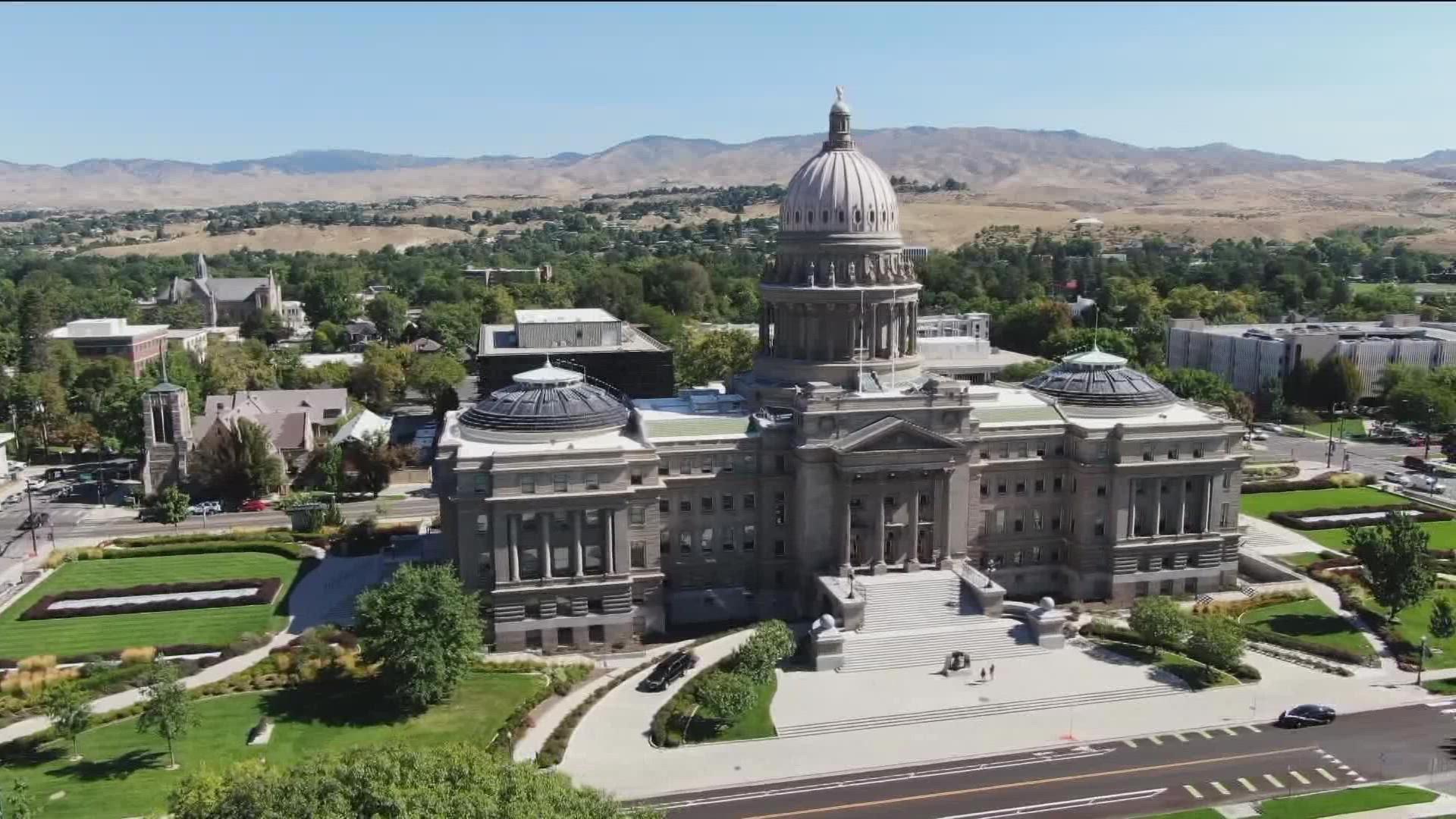BOISE, Idaho —
This story originally appeared in the Idaho Press.
Idaho long has been known for its gun-friendly laws and minimal restrictions on firearms, but one aspect of that — allowing visiting crowds to carry open or concealed firearms in the state Capitol during the legislative session — is sparking new debate among lawmakers.
In the wake of multiple deadly mass shootings across the nation, Idaho’s Legislative Council sat recently for a Capitol security briefing, and Sen. Melissa Wintrow, D-Boise, brought up the subject.
“I would respectfully request that we explore that again … please!” Wintrow told her fellow legislative leaders on the council, as first reported by Boise State Public Radio.
“I wish I would have made a motion, frankly,” Wintrow later told the Idaho Press. “We continue to struggle with civility and diplomacy here in our state, and with folks so well-armed, and after watching, right after the pandemic, people crashing through a door upset and violent, it would behoove us to have a discussion about time, place and manner in a Statehouse where different discussions are happening that tend to upset folks one way or another.”
Wintrow was referring to the Aug. 24, 2020 incident in which an unruly, armed, overflow crowd led by anti-government activist Ammon Bundy pushed into the Idaho House gallery during a special legislative session, shattering a glass window in the gallery door in the process and then packing the gallery in defiance of social distancing rules during the COVID-19 pandemic.
Wintrow noted that Idaho has restrictions on carrying firearms in places like courthouses and airports, and said the Statehouse is similar. “There’s just no room for firearms in that setting,” she said. “Everyone needs to feel safe to come to their government. And quite frankly, I know some of my constituents don’t feel safe to come there when all of those people are armed, and I think they kind of capitalize on that and influence people to stay out of their government, which is unfortunate. And it’s bullying.”
Senate President Pro Tem Chuck Winder, R-Boise, said there clearly were issues in 2020 and 2021 during legislative sessions. “What we have done to basically reduce those fears for the public is we have just basically tripled our law enforcement presence … with beefed-up security,” he said. “So we have done some things to make people feel safe and be safe. And we didn’t have any of that in this last 2022 session. I don’t think anyone who was there ever said anything about feeling unsafe during this session.”
“Based upon what happened during 2022, I’m very comfortable,” Winder said. “I think the state police did a wonderful job. They had cooperation with the Boise Police. … I think overall, we’ve improved the safety immensely for the public that feel free to come and testify and not be challenged by anybody.”
House Minority Leader Ilana Rubel, D-Boise, disagreed. “I was very glad she raised that,” she said of Wintrow. “I always wonder if there isn’t some intentionality to that – whenever there’s a gun bill, we always have armed people staring us down from the gallery. It’s a little disconcerting, and we know that some of these people snap. And we know that the person who shot people at the mall was one of the frequenters of our Statehouse, and it could just as easily happen at the Statehouse as at the mall.”
“In recent years, we’ve seen tempers running hotter than ever in there,” Rubel said. “For the members of the public, it’s absolutely crucial that they feel comfortable and safe coming down and testifying to their government, and I know that people are starting to feel more intimidated in that regard.”
Rep. Judy Boyle, R-Midvale, often a lead sponsor of gun-rights legislation, said she sees no need for change. “Citizens carry firearms for self-protection which is their right,” she said by email. “They can also stop others from doing harm to another person. Criminals know if firearms are allowed, they are taking a much larger risk compared to a ‘gun free zone.’ In those types of areas, only the criminals have guns, and then everyone but them are a potential victim.”
In February of 2021, an AP survey showed that 21 states allow guns in their state capitols in some form; eight allowed only concealed guns, while two allowed only open carry. Idaho allows either. The AP also reported that several states have been moving to bar guns from their statehouses; Michigan banned open carry in the state Capitol after the Jan. 6 riot, and Washington passed legislation in May 2021 barring open carrying of firearms within 250 feet of its state Capitol grounds and permitted demonstrations.
Winder said, “I think Idaho’s always been very protective of 2nd Amendment rights, people’s ability to carry either open or concealed. I think the discussion that’s going on at the national level now really focuses on control of the individual and not control of the gun, because it’s people, it’s mental illness, it’s drugs, it’s racism, it’s all the evils that are out there that come from people.”
“And so, does it deserve to have a discussion?” he said. “It probably deserves a discussion. Will it go anywhere? Based on our current Legislature, I don’t think you’ll see any changes.”
Fallout compensation program extended
Idaho Sen. Mike Crapo announced late last week that legislation he pushed to extend the Radiation Exposure Compensation Act program for two more years was signed into law by President Joe Biden, though the program still hasn’t been extended to cover Idaho downwinders. But without the extension, the entire program would have expired in July, making efforts to expand it much more difficult.
RECA provides $50,000 payments to compensate people who lived downwind from the Nevada nuclear tests from 1945 to 1962 and developed multiple cancers as a result, but the only downwinders eligible for the payments are those who lived in certain counties in Utah, Nevada and Arizona. The program also compensates uranium workers in multiple states who were exposed to the fallout, along with workers who were present at the test site. Among those who suffered in Idaho were numerous residents in the Emmett area, as well as other Idaho hot spots, where radioactive fallout settled on local crops, contaminating the fresh milk and produce local farm kids were fed. Many have now died.
“Many Idahoans have suffered the health consequences of exposure to fallout from nuclear weapons testing,” Crapo said in a statement, “and I will continue to work for the passage of important legislation that ensures their reparation.” He said he’ll continue to push his bipartisan bill to expand the downwinder payment eligibility to then-residents of Idaho, Colorado, Montana, New Mexico and Guam, who all were impacted.
Idaho’s Gem County received the third-highest amount of fallout in the nation, according to a 1997 National Cancer Institute study.
This story originally appeared in the Idaho Press. Read more at IdahoPress.com
Watch more Local News:
See the latest news from around the Treasure Valley and the Gem State in our YouTube playlist:



